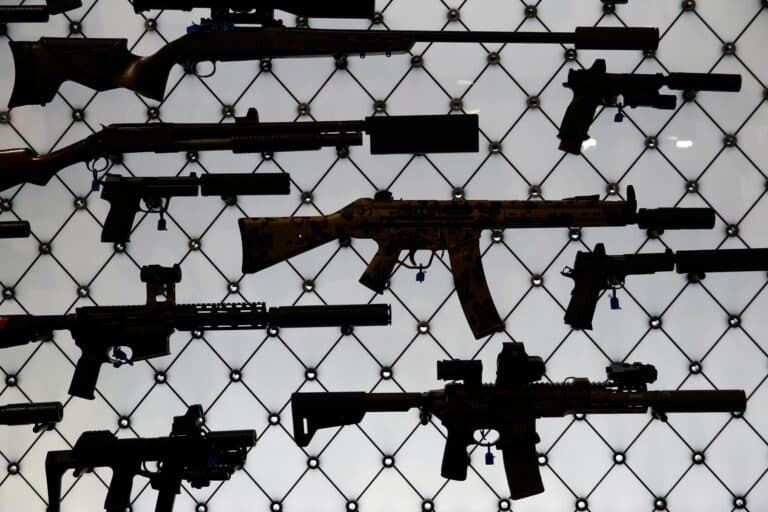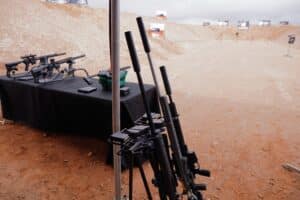Silencers may soon be much easier to buy.
On early Thursday morning, House Republicans narrowly passed their massive budget bill. Included in that bill at the last moment was an amended provision that would remove silencers from the purview of the National Firearms Act of 1934 (NFA). That would eliminate the need to pay a $200 tax and register the sound-suppressing devices, leaving sales of them subject to the same FBI background check required for regular gun sales.
The devices have grown increasingly popular in recent years, and House Republicans project eliminating the tax on them would cut about $1.4 billion from the budget over 10 years. They are the most popular NFA item, with more than 4 million currently registered. More than half of those registrations were made over the past four years alone, according to the Congressional Sportsmen’s Foundation.
The bill represents a new high-water mark in the gun-rights movement’s decades-long campaign to loosen the rules around silencers. It is the first time that silencer deregulation has passed the House of Representatives, and gun-rights advocates are confident it can make it to President Donald Trump’s desk as a final part of the larger package. However, it faces a high hurdle in the coming Senate reconciliation process, which some Republicans believe it can’t clear.
In addition to delisting silencers from the NFA, the bill includes a fallback provision that would take the tax on making or transferring silencers down to zero. That’s a holdover from what came out of the House Ways and Means Committee, where the silencer tax cut was first included. That provision, which only eliminated the transfer tax, garnered a ferocious backlash from some gun-rights groups–especially Gun Owners of America (GOA) and the National Association for Gun Rights, which framed it as a betrayal.
Multiple sources on both sides of that fight, who asked not to be identified because they weren’t authorized to talk publicly about what happened, spoke with The Reload about the situation.
The gun groups complained the provision didn’t go far enough and gave up the best shot at repealing parts of the NFA, including those that cover short-barrel rifles and shotguns, given the lower bar needed for bills to pass through reconciliation. Ways and Means Republicans argued delisting silencers or other items from the NFA wouldn’t clear the Senate’s reconciliation process. They argued the tax cut was the best they could hope to achieve, and that it represented the biggest federal gun law reform in decades–one Republicans didn’t even try the last time they controlled Congress.
“When these groups tell their members that major Second Amendment reforms can be accomplished through the Budget Reconciliation Process, that is misleading and dishonest,” a senior GOP staffer told The Reload. “I thought a general rule of thumb – no matter what context – was to always under promise and over deliver. The sad part is that our most supportive Second Amendment voters are going to be disappointed no matter what we do because Congress cannot deliver what has been advertised to them.”
That reasoning didn’t convince gun-rights advocates, who are confident their interpretation of Senate rules is correct.
The dispute boils down to how the provision delisting silencers will fare under what’s called the Byrd Rule. That rule governs the reconciliation process, a special budget procedure that allows the Senate to pass budget bills with a bare majority instead of the 60 votes needed to clear the legislative filibuster. The Senate designed the process to prevent measures whose primary purpose isn’t to impact the budget from making it into budget bills, but the determination of what does and doesn’t qualify is complex and left up to the Senate Parliamentarian.
The gun-rights groups argued that, because the NFA is, according to multiple federal court rulings, a tax that includes registration as a mechanism for enforcing its tax, repealing the registration aspects on the most popular items should fit under the rules just as well as eliminating the tax itself. GOA and NAGR, while the most aggressive in attacking Republican members over the bill, were far from alone in their view on how the provision should be viewed by the Parliamentarian. Dozens of industry members and gun-rights groups, including the National Rifle Association and SIG Sauer, signed on to an American Suppressor Association letter urging GOP leadership to include delisting.
Ways and Means Republicans and their allies argued that view was simply wrong. They argued that while most Republicans on the committee support delisting silencers, the Parliamentarian was likely to rule that eliminating the registration requirement is a policy goal rather than a budgetary one. They claimed to have spoken with a former Parliamentarian with insight into the thinking of the current one, who warned delisting wouldn’t survive the Byrd Rule. They said a Senate Republican office got the same answer when it looked into the question.
In the end, other House Republicans sided with the gun-rights groups and backed adding delisting to the bill in addition to the tax cut. House leadership agreed to include delisting, although only of silencers and not shot-barrel shotguns or rifles, in the final package through the rules committee. That language passed the House by a vote of 215 to 214.
The budget bill now heads to the Senate, where it will likely undergo a weeks-long review. After that process, it will head back to the House for final approval. Republicans have set an early July deadline for completing the process, but it’s not clear if they’ll be able to stick to it.







5 Responses
Great reporting. I wonder what leadership’s rationale was for leaving out SBRs and SBSs. Especially considering the possibility that it will only remove the tax, not the registration.
From what my sources have told me, there wasn’t enough Republican support to include SBRs and SBSs in there. Silencers are more popular and have been the center of the fight over the NFA for longer. So, that may be why.
At the end of the day, vote counting is the name of the game. But it seems like an easy sell, especially considering the pistol brace fiasco must have brought it to members’ attention. A win is a win, so I am still glad to see the ball being pushed forward.
There’s a lot of discussion on social media that, as written, the sale of new suppressors would become illegal in states like Colorado if this bill became law. This is because in Colorado, possession of a suppressor (legally, a “dangerous weapon”) is a Class 5 felony, unless the person has a “valid permit and license” (i.e., a tax stamp). Removing suppressors from the NFA means that Coloradans have no way to legally acquire new suppressors once the law goes into effect, as there would be no way to acquire a “valid permit or license”.
Is this interpretation correct, based on Colorado law and the proposed changes to Federal law? If so, how many other states have similar quirks in their laws that would result in an effective ban on the sale of new suppressors as a result of this change to Federal law?
My understanding is that delisting silencers from the NFA may cause issues for residents of some states because of how state laws are worded. As you note appears to be the case in Colorado, some states outlaw silencers but make an exception for those with federal tax stamps. So, yes, this could have a negative effect for silencer owners in some states.
I don’t know exactly how many states that will impact, but I will look into it. What I’ve been told by some folks at the gun-rights groups looking at this is it’s not a widespread problem. But it is one that would likely have to be dealt with at the state level if silencers are delisted from the NFA.